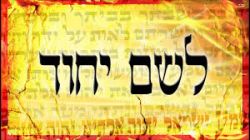Leshem Yichud: Difference between revisions
From Halachipedia
Tags: Mobile edit Mobile web edit |
|||
| Line 10: | Line 10: | ||
# One of the purposes in reciting Lshem Yichud is to focus one's intent on the mitzvah at hand. This is part of the general obligation to do mitzvot intentionally. See the [[Having Kavana for Mitzvot]] page for more details. | # One of the purposes in reciting Lshem Yichud is to focus one's intent on the mitzvah at hand. This is part of the general obligation to do mitzvot intentionally. See the [[Having Kavana for Mitzvot]] page for more details. | ||
==Specific Cases of Lshem Yichud== | ==Specific Cases of Lshem Yichud== | ||
# In the | # In the Leshem Yichud for the Sefirat Haomer it is proper not to recite the words לקיים מצות עשה since halachically we hold that it is only rabbinic.<ref>Or Letzion 3:16:2 writes that one shouldn't recite it but if one wants one can.</ref> | ||
==Further Reading== | ==Further Reading== | ||
Revision as of 02:59, 2 July 2020
Many have the custom to recite a short prayer known as Leshem Yichud before every Mitzvah, prayer, and Torah learning.
Practice to Recite It
- Some say that it is not obligatory, and, in fact, the Noda BeYehudah took serious issue with reciting Leshem Yichud.[1] Nevertheless, one who can focus more intently on what he is doing by reciting Leshem Yichud prior to the action or prayer should do so.[2]
Reciting Hashem's Name
- One should be careful not to pronounce or even spell out the Shem Havaya in the text of the Leshem Yichud.[3] See Not_Enunciating_Hashem's_Name_as_It_Is_Written and Not_Saying_Hashem's_Name_in_Vain#Changing_the_Pronunciation_of_Hashem.27s_Name for more details.
Purpose
- One of the purposes in reciting Lshem Yichud is to focus one's intent on the mitzvah at hand. This is part of the general obligation to do mitzvot intentionally. See the Having Kavana for Mitzvot page for more details.
Specific Cases of Lshem Yichud
- In the Leshem Yichud for the Sefirat Haomer it is proper not to recite the words לקיים מצות עשה since halachically we hold that it is only rabbinic.[4]
Further Reading
Sources
- ↑ Noda BeYehuda, Mahadura Kamma Yoreh Deah 93 and Mahadura Tinyana Orach Chaim 107 in an attack on Chassidim. Magen Avot (Orach Chaim 1 fn. 1 at the end) cites Rav Yosef Meshash (Mayim Chaim 1:61) who opposed it in his community of Meknes.
- ↑ Yalkut Yosef Kitzur Shulchan Aruch 5:7. See Yechaveh Daat 3:48 and 6:29, and Emek Yehoshua 3:20 cited in Magen Avot (Lebhar, Orach Chaim 1 fn. 1 at the end). Rav Ovadia Yosef's practice was not to recite the Lshem Yichud as it isn't an obligation and only said it before the Sefirat Haomer.
- ↑ Yalkut Yosef Kitzur Shulchan Aruch 5:8. Yabia Omer (vol. 9 Orach Chaim 12) writes that one should not recite the letters Yud Hey Vav Hey as Tosfot and many other poskim write that it is forbidden. Nonetheless, one can recite Yud Key Vav Key since Key is a mispronunciation of the letter Hey. He adds that it is better to recite Yud Ey Hey Vav Ey Hey. Orchot Maran v. 1 2:2 writes that Rav Ovadia Yosef himself would say Yud Key Vav Key.
- ↑ Or Letzion 3:16:2 writes that one shouldn't recite it but if one wants one can.
